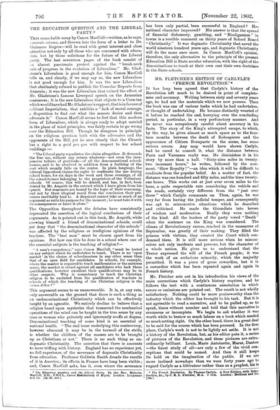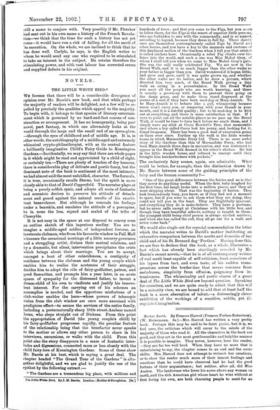MR. FLETCHER'S EDITION OF CARLYLE'S " FRENCH REVOLUTION."*
IT has long been agreed that Carlyle's history of the Revolution left much to be desired in point of complete- ness and accuracy. Writing between sixty and seventy years ago, he had not the materials which we now possess. Then the book was one of various tasks which he had undertaken, or thought of undertaking. He became distinctly wearied of it before he reached the end, hurrying over the concluding period, in particular, in a very perfunctory manner. And he never was scrupulously careful about accuracy in his facts. The story of the King's attempted escape, to which,. by the way, he gives almost as much space as to the four- teen months between the death of Robespierre and the appearance of Citizen Bonaparte on the scene, has some serious errors. Any map would have shown Carlyle, had he cared to consult it, what the distance between Paris and Varennes really was. He diminishes it in his story by more than a half. " Sixty-nine miles in twenty- two incessant hours," he writes, followed by the com- ment, "Slow Royalty ! "—an idea which it will be difficult to eradicate from the popular belief. As a matter of fact, the distance was one hundred and fifty miles, and the time twenty- one hours. This works out at just over seven miles to the hoar, a quite respectable rate considering the vehicle and the roads, certainly very different from the " just over three " which Carlyle comments on. Then, again, he was very far from having the judicial temper, and consequently was apt to misconceive situations which he described and criticised. He made the Girondists into heroes of wisdom and moderation. Really they were nothing of the kind. All the leaders of the party voted "Death" when the sentence on the King was considered. The climax of Revolutionary excess, reached in the massacres of September, was greatly of their making. They filled the prisons with victims, they created the Court which con- demned them. It is still more serious when he miscon- ceives not only incidents and persons, but the character of a whole nation. He gives us to understand that the Terror expressed the will of the French people; it was the work of an audacious minority, which the majority permitted. It was a piece of gross cowardice, but it is a cowardice which has been repeated again and again in French history.
Mr. Fletcher sets out in his introduction his views of the main corrections which Carlyle's history requires, and he follows the text with a continuous annotation in which errors or omissions are pointed out. The result is not wholly satisfactory. Nothing could be more praiseworthy than the industry which the editor has brought to his task. But it is not agreeable to read a narrative, and to be pulled up, so to speak, times without number and told that this narrative is erroneous or incomplete. We begin to ask whether it was while to bestow so much labour on a book which needed. so much setting right. On the other hand, there is a great deal to be said for the course which has been pursued. In the first place, Carlyle's work is not to be lightly set aside. It is not a history of the Revolution, but, as his editor puts it, a series of pictures of the Revolution, and these pictures are extra- ordinarily brilliant. Louis, Marie Antoinette, Marat, Denton —the finest study of all—are only a few of the vivid con- ceptions that could be named. And then it still keeps its hold on the imagination of the public. If we are more inclined nowadays than we were forty years ago to regard Carlyle as a iitterateur rather than as a prophet, his is • The French Revolution. By Thomas Carlyle. A New Edition, with Intro- ductio 1 n, lc., by C. R. L. Fletcher, N.A. 9 vols. London : Methuen and Co. [1134.
still a name to conjure with. Very possibly if Mr. Fletcher had sent out in his own name a history of the French Revolu- tion—we think that the time for such a history has not yet come—it would have run a risk of failing, for all the merit of Is execution. On the whole, we are inclined to think that he has done well. Carlyle, he says, is the English writer to whom he would send any one who required to be stimulated to take an interest in the subject. He retains therefore the stimulating power, and with vast labour has corrected errors and supplied defects in his original.











































 Previous page
Previous page